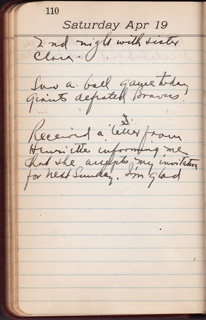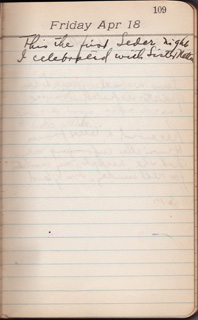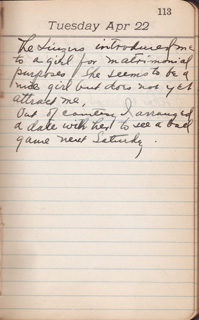 2nd night with Sister Clara
2nd night with Sister Clara
Saw a ball game today
Giants defeated Braves
Received a letter from
Henriette informing me
that she accepts my invitation
for next Sunday. I’m glad
————-
The “second night” Papa refers to is a Passover Seder, the first of which he attended at his sister Nettie’s house the night before. Passover traditionally involves two Seders, and in some families it also involves political squabbles over who goes to whose house on which night. Nettie and Clara supposedly didn’t get along, so I expect some such scandal arose; they may not have seen each other at all for the holiday even though they lived in the same neighborhood.
I’m sure Papa wasn’t bothered by any familial tension — or much of anything — since Henriette, the storied “20th Century Girl” who had put his heart through a ringer a few weeks earlier, finally agreed to see him again. (He had written her a declaration of affection on March 30th after they’d gone to the opera together. Could this be the first time he’d heard from her since then?)
Papa further enjoyed himself at the Polo Grounds that day, which answers my question about whether Jewish law permits baseball game attendance during Passover. And much as Moses smote Pharaoh’s army, the Giants defeated the Boston Braves on a game-winning Henry Groh double in the bottom of the ninth. (The New York Times account is a great specimen of the humorous, ironic baseball writing they practiced in that era.)

On the field for the Giants was Irish Meusel (pictured below with his brother, Yankee slugger Bob Meusel, who Papa had seen in an exhibition game a few days earlier) while the Boston Braves fielded the legendary Casey Stengal and a four-time MVP with the fantastic name of Stuffy McInnis.

Here are the full lineups:
New York
Billy Southworth, cf
Heinie Groh, 3b
Frankie Frisch, 2b
Irish Meusel, lf
George Kelly, 1b
Travis Jackson, ss
Hank Gowdy, c
Bill Terry
Virgil Barnes, p
Jimmy O’Connell
Rosy Ryan, p
Boston
Dave Bancroft, ss
Johnny Cooney, rf
Bill Cunningham, lf
Cotton Tierny, 2b
Stuffy McInnis, 1b
Casey Stengel, cf
Ernie Padgett, 3b
Mickey O’Neil, c
Joe Genewich, p
—————–
Additional References:
—————-
Image sources:
- Meusel, Emil F. “Irish” (Giants) & Bob Meusel (Yankees), 10/10/1923. Library of Congress #LC-B2- 6077-13
- Polo Grounds, 1923. Library of Congress #LC-B2- 5982-2





 2nd night with Sister Clara
2nd night with Sister Clara




